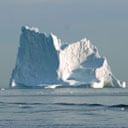The world's scientists today issued a grim forecast for life on earth in publishing their latest assessment of the impact of climate change. A warming world will place hundreds of millions of people at greater risk of food and water shortages and threaten the survival of thousands of species of plants and animals, the scientists said. Floods, heat waves, storms and droughts are all expected to increase, with people in poor countries suffering the worst effects.
Rajendra Pachauri, chair of the expert panel that published the report, said: "It's the poorest of the poor in the world, and this includes poor people even in prosperous societies, who are going to be the worst hit."
Martin Parry, who co-chaired the working group that produced the report, said there was evidence that climate change was having a direct effect on animals, plants and water. "For the first time, we are no longer arm-waving with models. This is empirical data, we can actually measure it."
He said four areas of the world were particularly vulnerable: "The Arctic, where temperatures are rising fast and ice is melting; sub-Saharan Africa, where dry areas are forecast to get dryer; small islands, because of their inherent lack of capacity to adapt, and Asian mega-deltas, where billions of people will be at increased risk of flooding."
The report was issued in Brussels by the UN Intergovernmental Panel on Climate Change (IPCC). Its release was delayed by arguments between scientists who wrote a draft, based on published evidence, and some government representatives present, who had to agree upon the final text and insisted some of its conclusions be watered down. "The authors lost," one scientist in the negotiations told the Associated Press. "A lot of authors are not going to engage in the IPCC process anymore. I have had it with them." Scientists, who at one stage walked out of the talks in protest, said delegations from Saudi Arabia, Russia and China had raised the most objections. The US also wanted some passages removed.
The final report says that natural systems on all continents and in some oceans are being affected by rising temperatures. It says warming caused by human activity has "likely had a discernible impact on the global level on many physical and biological systems". Up to 30% of species face "an increasing risk of extinction" if temperatures climb by 1-4C, as they are predicted to this century if emissions continue to rise. A temperature rise beyond 4C would bring "significant extinctions around the globe". Coral reefs, boreal forests and alpine ecosystems could also be damaged irreversibly as temperatures continue to rise.
Neil Adger, a scientist at the Tyndall Centre for Climate Change Research, at the University of East Anglia, who helped to write the new report, said: "There are no winners from the impacts of climate change. No country is immune. All around the world, from retreating glaciers, through to earlier fish migrations in rivers, the impacts of climate change are upon us."
Ian Pearson, the environment and climate change minister, said: "This report provides further evidence of why all countries need to work urgently to agree a global deal to combat climate change. People are already being affected, and if we don't act now millions more will suffer. But reducing emissions is not enough. Because we can't avoid some of the impacts of climate change that are already happening, we must anticipate and plan for the changes ahead, including changed stability and security conditions. The European heat wave of 2003 and the 2005 North Atlantic hurricane season show that developed countries are also vulnerable to climate change and so must adapt."
Professor Adger said: "Adaptation is necessary but not a panacea. The report highlights new observations that adaptation is occurring now - local governments and individual farmers, home owners and water and insurance companies are all changing their locations, business practices and policies. At present, these efforts at adaptation are nowhere near sufficient."
Yesterday's summary of the report for policy makers follows a similar UN summary of the science of global warming, which concluded in February that human activity was "very likely" to blame for recent warming. A third IPCC summary report, on possible ways to tackle the problem, will be published next month. Together, they will underpin international negotiations on a new global treaty to regulate carbon emissions to replace the Kyoto protocol in 2012.
Jim Footner, a climate campaigner with Greenpeace, said: "It's clearer than ever that millions are at risk from devastating climate change. The poorest people will be hardest hit, despite being least to blame. The UK has played a major role in causing the problem and we must play a leading role in solving it - but, appallingly, our CO2 emissions are rising. It's time for solutions that match the scale of the threat. To avert disaster, the government needs to stop sitting on its hands and start implementing the solutions that already exist - decentralised energy, renewable energy and energy efficiency."
